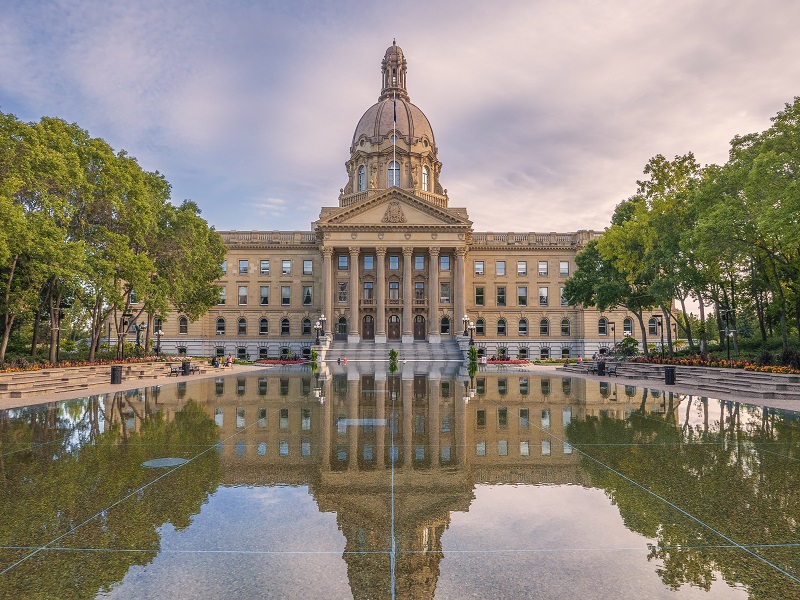
Alberta’s Fair Deal panel is recommending that the provincial government withdraws from the Canada Pension Plan and creates its own, subject to a referendum.
“The panel recommends vigorously exploring this option and conducting the due diligence needed to assure Albertans that benefits and risks are understood and can be positively managed,” wrote the panel. “Albertans will want to be assured that the [Alberta Pension Plan] would be managed independently in an arms-length manner by an experienced manager using best governance and practices for pension plan management.”
The panel was launched by Premier Jason Kenney to consult with Albertans on how to advance the province’s economic interests and increase provincial powers. It came in the wake of a federal election that saw the Liberal party fail to capture any seats in the province, highlighting Albertans’ frustration with Prime Minister Justin Trudeau’s government.
Read: Alberta will study already ‘compelling case’ for its exit from CPP: Kenney
In its response to the panel, the provincial government said it would conduct further analysis on the proposal. “If that analysis concludes that an Alberta Pension Plan would be a net benefit to Albertans, we would then proceed to give Alberta voters the final say on the proposal in a province-wide referendum,” said Kenney during a news conference.
In its proposal, the panel referenced research from the Fraser Institute that said Alberta’s younger population, higher incomes and historically higher rates of employment means its workers contribute “disproportionately” to CPP. While workers represented 16.5 per cent of total contributions to the CPP in 2017, provincial retirees represented 10.6 per cent of CPP payouts, creating a $2.9-billion contribution gap. The institute hypothesized that an APP would allow Alberta’s contribution rate to decrease from its current 9.9 per cent to as low as 5.85 per cent while maintaining base benefits at a comparable level to the CPP.
A January report by Keith Ambachtscheer, founder of KPA Advisory Services Ltd. and adjunct professor at the University of Toronto’s Rotman School of Management, took issue with those conclusions. He noted that, while the influx of young workers moving to Alberta from across Canada to work in the oil and gas industry over the last 25 years and the higher wages have contributed to the province’s current contributor status, workers have started to leave the province as the fossil fuel sector has been hit by climate change policies, reduced oil and gas demand and a lack of pipelines to get those products to market.
Read: Proposed Alberta Pension Plan has underwriting, political risks: report
If these trends continued for the next 25 years, he wrote, the base contribution rate for the APP would need to be higher for the plan to be sustainable, similar to the Quebec Pension Plan, which currently has a base contribution rate of 10.8 per cent.
“Dropping the APP’s starting contribution rate two to four percentage points below the base CPP’s 9.9 per cent rate would expose APP members to underwriting risk in the form of potential benefit reductions, higher contribution rates or some combination of the two sometime in the decades ahead.”
If the province were to go ahead with an APP, Alberta’s portion of the CPP’s $400-billion reserve fund — which is estimated by the Fraser Institute to be between $40 billion and $70 billion — could be transferred to an APP reserve fund to partially cover the accrued payment obligations a provincial pension would assume from the CPP, said the panel. The province could choose to keep these funds under the Canada Pension Plan Investment Board’s management or transfer them to the Alberta Investment Management Corp. or another fund manager after a risk and benefit analysis.
Read: The Alberta Pension Plan is no slam dunk: memo
“Any fund manager(s) selected for the APP fund would be guided by a clear governance and accountability mandate to deter political interference,” wrote the panel.
It noted it received “substantial” feedback on the proposal, both for and against. Those who supported creating an APP felt Alberta was contributing disproportionately to the CPP, given its younger workforce, and pointed to Quebec’s successful management of its own pension plan as proof that Alberta could do the same.
However, several people also expressed concerns with the security of their pension if it was taken out of the CPP, saying APP funds would need to be invested using global best practices for pension plan management. “An Alberta Pension Plan would be an unnecessary and devastating decision that has no potential value and would be wide open to favouritism and mismanagement,” said one Albertan, quoted in the report.
The panel noted that the portability of Alberta’s pension funds wouldn’t be an issue, as the CPP has established procedures in place to deal with the QPP. However, under the Canada Pension Plan Act, a province must give three years’ written notice to be able to exit the CPP.
Read: AIMCo calls reports of losses on volatility strategy ‘dramatically’ overstated
Alberta New Democratic Party leader Rachel Notley called the report a “distraction technique and a cynical one at that” in a video statement, taking particular aim at the APP proposal.
“This report is a harbinger of higher costs, lower returns and it threatens the security of every Albertan hoping to retire comfortably after a lifetime of hard work,” she said. “Let me be clear: the last thing Albertans want is this premier’s hands anywhere near their retirement savings.”
Christina Gray, the party’s labour and immigration critic, tabled a bill last week to reverse the provincial government’s plan to transfer teachers’ pensions to the AIMCo and to prevent Alberta from withdrawing from the CPP. If passed, Bill 203 would require current or future provincial governments to consult with pension holders before making any changes to the plans’ administration.
Read: Alberta NDP introduces bill to reverse teachers’ pension transfer to AIMCo
